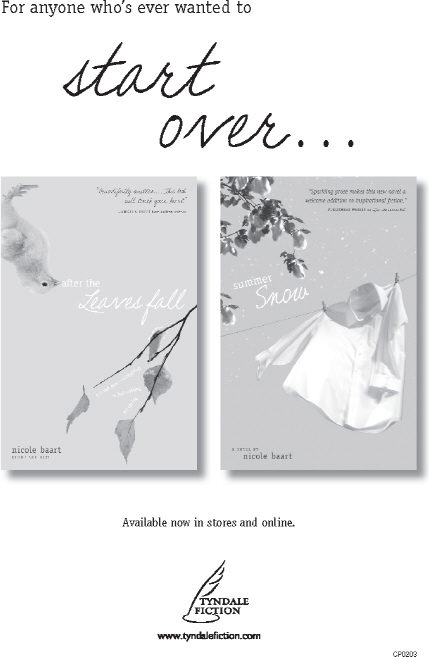Summer Snow (39 page)
But the note of anxiety that rang in the car was nothing more than a distant echo when I was settled into one of the prettily apportioned delivery rooms. After a quick exam, the nurse determined that I was close but not yet ready, and that settling in for a few hours of labor was the best thing I could do. They hooked me up to monitors and started an IV just in case, and when the room was finally quiet and relatively still but for the rustle of a long ribbon of paper slowly unwinding as it recorded my contractions, Grandma reached over the low rail of my bed and grabbed both of my hands in her own. Her fingers were strong, calm.
“You are going to be fine,” she said.
“Yeah,” I whispered slowly. “I think I am.”
“You are going to make a great mother.”
“I'm going to try.”
“Your dad would be so proud of you.”
“He would?” I choked.
“
I
am so proud of you.” Her eyes were clear and bright and happy as she said it. There was not even a trace of a tear or any lingering tang of the bittersweet nature of our lives up until this point. Instead, there was hope burning there. A hope that was far more certainty, more expectation, than a simple, improbable wish.
“Thank you,” I said, because there was nothing else to say. Of course I could tell her “I love you,” but she already knew that. It was written all over my face and seeping through my fingers as I held on to her with all of my strength. I had said those words to her every day of my life. But had I ever really thanked her for everything that mattered? Grandma had heard my appreciation for the little things, but did she know that the debt of gratitude I owed her was more than I could ever repay?
“Thank you,”
I said again, willing her to understand what I meant by it.
“Julia,” she whispered back, “thank
you
.”
Grandma was an exceptional birth coach, and she never stopped murmuring to me through the contractions, the pushing, the inevitable fear. She rubbed my back and talked me out of panic. She pushed away the little hairs that clung to my neck.
We labored together for over three hours, and when Daniel was only minutes from the world, Grandma kissed my head and laughed. “This is it!” she cheered. “He's almost here!”
And then she began to cry.
After Dr. Morales had cut the umbilical cord, he reached up and gently, gently laid my baby boy on my chest. The nurses hadn't weighed or measured him yetâhe was only seconds newâand when I felt the weight of him over my heart, something raw and holy passed over me. I gasped. I struggled for air. Almost involuntarily I put my hands over him, and his little body was so soft and fragile as to be a dream hidden in my palms.
“Daniel Peter,” I breathed.
I knew him. This child was mine, a part of me, and yet somehow wholly
other
. We were intertwined, woven together, but only because He had chosen to braid the strands of our lives. I realized even as I pressed Daniel to me that his presence in my arms was an unexpected gift. Something that I could never claim to deserve. Something that would cause me to spend the rest of my life trying to be worthy of what I had been given.
I was humbled.
I was laid low. Spent as a sacrifice burning beneath His glory.
But in the depths blew the sacred wind of freedom, of letting go. I drank it in joyful mouthfuls, swallowing my tears and letting it fill me. It was beautiful. Because I was finally ready. Ready for the imprint of grace like His signature beneath my skin. Ready for all there was to come, knowing that the light only shone bright because of the shadows around it. Ready. Ready and open, willing to receive the immensity of heaven spread wide as a blessing and unfurling above me.
1. Â At the end of
After the Leaves Fall
, Julia's faith in God seemed to be maturing. Where is she at the beginning of this story? Has your faith journey ever mimicked hers?
2.  Nellie warns Julia about the danger of holding on to a bitter root on p. 126. Have you ever been in a situation like Julia's where you needed to forgive someone? What effect did it have on your life?
3. Â Why do you think Janice behaves the way she does throughout the novel? What is motivating her? Is it the same need that is motivating Julia?
4. Â On p. 231, Nellie says to Julia: “You're not nearly as lost as you sometimes think you are.” Do you think that's true? What did Nellie mean by that?
5. Â Nellie tells Julia on p. 234 that seeds planted among thorns don't necessarily
die
but are
choked
. What are some of the “thorns” in your life that threaten to choke out God's grace?
6. Â On p. 293, Julia calls Janice and herself a “group of Simons.” What does she mean by that? What does she mean when she observes that they are “not enough, not enough, not enough”?
7. Â Why do you think Julia was finally able to forgive Janice?
8. Â How has Julia changed by the end of this story? What was the biggest catalyst for that change?
9. Â Do you think Julia makes the right decision regarding her future at the end of the story? Why or why not?
10. Â What was your favorite metaphor, line, or scene from the story? Why?
NICOLE BAART was born and raised in a small town in Iowa. After lifeguarding, waitressing, working in a retail store, and even being a ranch hand on a dairy farm, she changed her major four times in college before finally settling on degrees in English, Spanish, English as a second language, and secondary education. She taught and developed curriculum in three different school districts over the course of seven years.
Teaching and living in Vancouver, British Columbia, cultivated a deep love in Nicole for both education and the culturally inexplicable use of the word
eh
. She became a Canadian citizen for the sole purpose of earning the right to use the quirky utterance.
Nicole wrote and published her first complete novel,
After the Leaves Fall
, while taking a break from teaching to be a full-time mom.
Summer Snow
is the sequel. She is also the author of hundreds of poems, dozens of short stories, a handful of articles, and various unfinished novels.
The mother of two young sons and the wife of a pastor, Nicole writes when she can: in bed, in the shower, as she is making supper, and occasionally sitting down at her computer. As the adoptive mother of an Ethiopian-born son, she is passionate about global issues and works to promote awareness of topics such as world hunger, poverty, AIDS, and the plight of widows and orphans.
Nicole and her family live in Iowa.


